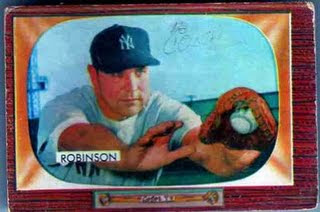
Mr. Andro started to look pretty damn tired in 2000, just two years removed from his record-setting* 1998 season, which he followed by another monster year* in which he jacked 65 home runs* (see what I'm doing with the asterisks here? Eh!?!?). In 2000, McGwire was 36 years old and, for one reason or another, was only playing half-time. Because Big Mac was still a man mountain, he was able to produce some epic power numbers in just 89 games. How epic? Try a .746 slugging percentage, the second-best of his career. McGwire's limited play and one-dimensional game also led to a pair of very strange (and less praise-worthy) individual achievements. In hitting 32 home runs in only 321 plate appearances, McGwire became the first player to reach 30 taters while failing to collect 200 total bases (he ended up with 176). The fact McGwire only mustered 8 non-homer extra base hits (all doubles), explains all. While McGwire's 176 total bases were unimpressive for someone with so many home runs, they were hugely impressive for someone with fewer than 75 total hits. In a twist that might lend some respect to Mark's 2000 season, McGwire became the only player in history to accumulate 175 or more total bases while rapping out fewer than 75 hits (he had 72). Does this redeem McGwire? Well, consider it in context...
Big Mac's 2001 season was like his 2000 campaign, but in mono. McGwire's body was failing him. The red-haired goliath was creaking, snapping, and popping every time he shambled up to the plate. Still, McGwire had some pop and the Cardinals let him play another half season. Continuing his descent into Billy Ashley-hood, McGwire set another two records in 2001, similar to those he set a year earlier. Riffing on a theme, McGwire was a one-dimensional savant, becoming the first player to ever hit 25 or more home runs with 5 or fewer doubles (he finished with 29 homers, 4 doubles, and 0 triples). Such a performance was a testament to the fact that McGwire wasn't simply slow (even Cecil Fielder was more amenable to doubles). No, McGwire was a broken man, racking up a .187/.316/.492 slash line, mainly on the strength of his home runs and 56 walks. Yep, McGwire looked tired, whiffing 118 times (32.4% of the time) and playing hideous defense. Still, he showed some power, setting a record that was similar to his 2000 TB/H milestone. In 2001, he was the first player to accumulate 135 or more (147, in his case) total bases with fewer than 60 hits (56). McGwire was still massive and, if you put the ball on his bat, he could take it yard. Still, it was clear the end was nigh and, after the 2001 campaign, McGwire retired, ready to take his rightful place in Cooperstown.
[Enter Jose Canseco]
[March 2005: Congressional hearings on steroid use in baseball]
[January 2007: 23.5% HOF support]
[January 2008: 23.6% HOF support]
[2005-2009: McGwire avoids media; becomes Bobby Crosby's hitting coach]
[2009: Signs on with Cardinals as hitting coach]
"I regret having lived in the Steroid Era"
Fin.
Records:
30+ home runs, 200- total bases
175+ total bases, 75- hits
25+ home runs, 5- doubles
135+ total bases, 60- hits
 Speaking of bizarre seasons for leadoff hitters, Samuel's 1984 season can be seen in one of two ways: (1) one of the great all-around seasons of the 1980s, or (2) one of the decade's strangest melanges of power-hitter and leadoff-hitter tendencies. Samuel was a slugger in a speedster's body, an intriguing mix of good and bad skills who, by 1987, had shown he was never going to become the next Honus Wagner. He did have one hell of an '84 season, though, becoming the only man in history to steal 50 bases and strike out 160 or more times. Further cultivating this schizophrenic skill set, Samuel hit 15 home runs and walked just 28 times (very Jose Hernandez), while also stroking 19 triples at the top of the Phil's lineup (a la Jimmy Rollins). Very strange.
Speaking of bizarre seasons for leadoff hitters, Samuel's 1984 season can be seen in one of two ways: (1) one of the great all-around seasons of the 1980s, or (2) one of the decade's strangest melanges of power-hitter and leadoff-hitter tendencies. Samuel was a slugger in a speedster's body, an intriguing mix of good and bad skills who, by 1987, had shown he was never going to become the next Honus Wagner. He did have one hell of an '84 season, though, becoming the only man in history to steal 50 bases and strike out 160 or more times. Further cultivating this schizophrenic skill set, Samuel hit 15 home runs and walked just 28 times (very Jose Hernandez), while also stroking 19 triples at the top of the Phil's lineup (a la Jimmy Rollins). Very strange.






























